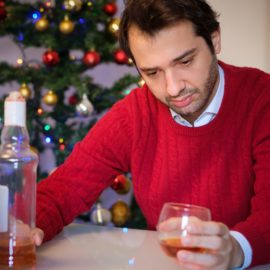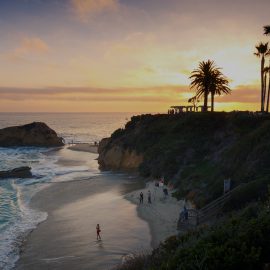Holidays and Relapse

Holiday cheer is in the air, which means champagne flutes are likely to be, too. For a recovering addict, the holidays can feel like a blessing and a curse. Unfortunately, most of us can’t skip them, but avoiding holidays and social situations aren’t always healthy, either. So, do holidays cause relapse? Holidays and relapse can have a lot in common.
What is a Relapse?
Relapse is when a recovered alcohol addict has a drink, or when a recovered drug addict uses a substance. Relapse happens when a recovering addict is overwhelmed by triggers. Triggers are what can cause cravings that lead to an addict drinking or using drugs and compromising their sobriety.
Relapse triggers can be the smell of a substance, seeing the substance, being tempted in the same room as the substance, talking about it in a glamorized way, reminiscing on times when you’ve used the substance, or just being in a place where you used the substance last.
For those who have just gone through addiction recovery, they may convince themselves that they can handle one drink. Worse, someone else during the holidays may convince them. The problem with a “one-time-use” is that people who are addicted to drugs or alcohol can’t self-regulate and only have one drink or one night with drugs, even after rehab.
Holidays and Relapse: Do Holidays Cause Relapse?
Relapse can quickly transition from “just one drink” to binge drinking or an overdose on drugs. It can be a fatal situation. Unfortunately, the holidays are associated with relapsing due to stress and loneliness. Relapse rates year-round are already at 40 to 60 percent for those with substance use disorders, according to the National Institute on Drug Abuse.
Drinking violations increased by an average of 33% between Thanksgiving and New Year’s Day compared to the rest of the year, according to a report that monitored DUI offenders.
Social pressure
With holiday cheer comes faces you haven’t seen in a while. It’s possible to experience increased stress or anxiety from your family, whose last impression of you was before you went to rehab. They may not understand your journey to recovery. Likewise, your old friends may want to enter the new year on mind-altering substances. Peer pressure can be a trigger and is especially prevalent around the holidays.
Loneliness
Holidays can be lonely for anyone—that’s why the bars stay open during this time of year. Being the only sober person in your circle of family or friends can be lonely. Instead of hitting the bottle, it’s a great time to reconnect with your support network from rehab or from sober living. Though everyone seems busy around the holidays, other newly sober people who have gone through rehab are in the same situation. They’re likely looking for a friend to support them, too. There are also likely support meetings available in your area around the holidays.
Finances
The holidays also mean a lot of extra spending. Flights to see family. Gifts for Christmas. Attending holiday parties. Financial troubles are one of the most common causes of stress, and stress is a major trigger for relapses. Coming up with all that money after having spent a lot of it on your treatment already can take its toll. If you dwell on those thoughts, you may be tempted to look to drugs or alcohol to alleviate your stress.
How to Avoid Relapse During the Holidays
On the other hand, there may be a greater display of empathy from your loved ones. Though it can be challenging to be newly sober, there are some ways to avoid relapsing on the holidays.
Come prepared.
Bring drinks with you such as soda or sparkling grape juice. Make sure you eat and sleep well before you attend a holiday gathering. HALT (hungry, angry, tired and lonely) is the acronym that can help you remember common emotional triggers that can occur at any time of the day. The more you’re aware of when your cravings can happen, the more you can do to avoid acting on them.
Recruit support.
Bring a dependable sober friend with you to the party. Most people are fine with being the designated driver for their friends for the night. You’ll have the DD to talk to if any temptations arise. Drive yourself so you can leave when you want to or when you need to, instead of having to wait around for a friend and be exposed to boredom and temptation.
If you’re at a family-only party, have a dependable family member look out for you. A family member can also help steer conversations in a positive direction if someone brings up an old memory of when you used to drink or do drugs.
Escape from your triggers.
Cravings only last between 15 and 20 minutes, so if you do have a craving, leave the room or talk to someone to distract yourself. If you can, avoid the rooms that have triggers. For instance, don’t stand by the bar all night. If conversation causes you to have tempting thoughts about drinking, drugs, or partying, excuse yourself. Get a non-alcoholic drink, have positive self-talk to yourself in the bathroom mirror, or get on a call with your sponsor or counselor.
Drug Rehab in Orange County
Do holidays cause relapse? For some, they do—but that doesn’t mean you have to be a statistic. With the financial and social stress of the holidays, it is easy to fall into a negative line of thinking, especially when everyone is focused on their own holiday preparations. But when you plan ahead and arrive at a holiday party prepared with snacks, a non-alcoholic beverage, a script, and a friend you can depend on, you’ll have a strong defense against your triggers.
Removing yourself from tempting situations is always an option. Remember, there are others going through addiction recovery who are also sober for the holidays, just like you. When you recruit your support network or enlist a family member to support you, you may just find yourself looking forward to the next holiday with confidence.
At Gratitude Lodge, our drug rehab in Orange County can help you hone your coping skills to use during the holidays. Contact Gratitude Lodge today for more information.
Call us now
Help for you or a loved one
is only one call away.
Resources
Don’t Let Addiction Control You
LET US HELP YOU FIND
YOUR NEW BEGINNING
Recent Articles
Similar Reads
Notice: Undefined variable: recent in /home/gratitudelodge/public_html/wp-content/themes/gratitude-lodge/single.php on line 107
Notice: Trying to access array offset on value of type null in /home/gratitudelodge/public_html/wp-content/themes/gratitude-lodge/single.php on line 107
Notice: Undefined variable: recent in /home/gratitudelodge/public_html/wp-content/themes/gratitude-lodge/single.php on line 107
Notice: Trying to access array offset on value of type null in /home/gratitudelodge/public_html/wp-content/themes/gratitude-lodge/single.php on line 107
Notice: Undefined variable: recent in /home/gratitudelodge/public_html/wp-content/themes/gratitude-lodge/single.php on line 107
Notice: Trying to access array offset on value of type null in /home/gratitudelodge/public_html/wp-content/themes/gratitude-lodge/single.php on line 107
Notice: Undefined variable: recent in /home/gratitudelodge/public_html/wp-content/themes/gratitude-lodge/single.php on line 107
Notice: Trying to access array offset on value of type null in /home/gratitudelodge/public_html/wp-content/themes/gratitude-lodge/single.php on line 107
Notice: Undefined variable: recent in /home/gratitudelodge/public_html/wp-content/themes/gratitude-lodge/single.php on line 107
Notice: Trying to access array offset on value of type null in /home/gratitudelodge/public_html/wp-content/themes/gratitude-lodge/single.php on line 107
Our Partners
We accept most PPO insurance
Drug and alcohol rehab should be accessible to everyone. At Gratitude Lodge,
we work with most insurance plans to cover the costs of treatment.






















